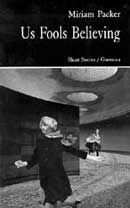
Us Fools Believing
Miriam Packer
Guernica Editions
$15
paperback
108pp
1-55071-056-7
There’s much to admire in the challenge Packer has set herself, to write entertainingly about being stuck. When the author commits herself to working in miniature – employing only the enlightening detail, forsaking most of the incidental pleasures that leaven even the most flattened lives – it’s a double challenge, and one this collection meets with only partial success.
Packer’s imagery can delight, and its disposal is always intelligent. In “Windows” a few motifs – the idea of cleanliness inverted, the frosted glass beyond which things cannot be seen, the dentist who leaves a hole stuffed with bloody cotton where a tooth used to sit – are gradually refocused until they resolve themselves as stifling home, pubescent shame, and incest. Their slow modulation matches the mental inward spiral that is the victim’s lot.
The technique is so nicely applied that it feels like quibbling to mention that a whiff of incest shows up elsewhere, a further story concerns non-familial molestation, two others turn on the death of a child, and three including “Windows” employ psychiatric wards. While I don’t doubt the honour of Packer’s intentions, it does sometimes seem that incest has taken the place the orphaned child once held, as the quickest shortcut to pathos. (Anorexia turns up too, and food anxiety is a running subtext.)
Still, the strong situations support the author’s miniaturist means, though the insights granted her characters sometimes lack clear motivation (as when the sight of his nurse in street clothes is enough to shake an addict’s smugness) and the turning point of one story, “Week-end,” is too contrived to satisfy.
Another minor complaint, concerning the author’s ear: setting, so far as the miniature allows background to be defined, is the Canadian urban jungle, identified once as Montreal. Yet Packer’s lower-class anglos all speak a sort of hybrid dialect from nowhere in particular and all over the English-speaking map: “she keeps busy, like,” “smacking me upside my head,” “it never came out right, no kind of way.” It sends her characters halfway towards caricature, and sometimes (“Give him back, harlot!”) stops you short.
When Packer turns to the more familiar and less obviously dysfunctional world her prose still doesn’t sing, and the details resonate less. Form doesn’t compensate: placing the ordinary unhappy family in a biblical frame, as she does in “Song for a Deaf Man and His Mute Daughter” – song in the sense of Solomon or Lamentations – may only remind you that ordinary unhappiness doesn’t cut it as biblical tragedy. Another three stories feature women who might be the mute daughter with a change of name, and a fourth a father of daughters. You assent to the truth of all these families’ failure to be what families wish they were, but that’s about it.
This past century has seen some great writing, especially poetry, about being stuck. The poet finds release in the enlightening image, but equally in the incidental pleasure of a clever rhyme or pleasing rhythm, and sometimes even wit. When incidentals are excluded and the best the hero can hope for is a sober view of where he may be stuck for good, when the situation is something like a nightmare – literally so in the last story in this collection – the pleasure can be slight, even allowing for quibbles. mRb






0 Comments